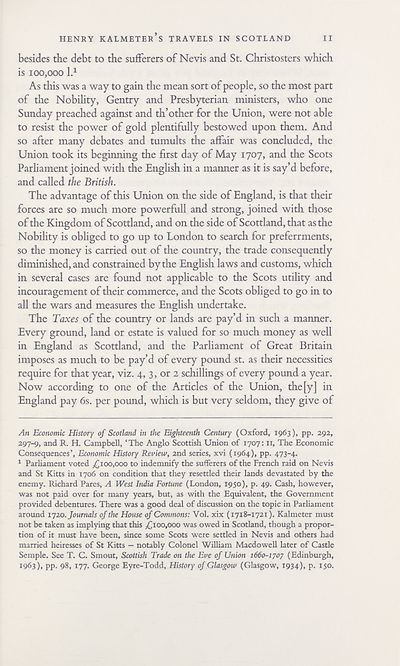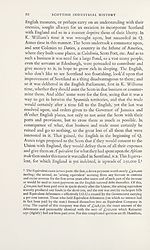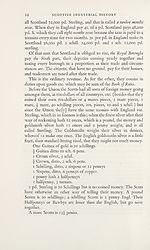Series 4 > Scottish industrial history
(56) Page 11
Download files
Complete book:
Individual page:
Thumbnail gallery: Grid view | List view

HENRY KALMETER’s TRAVELS IN SCOTLAND II
besides the debt to the sufferers of Nevis and St. Christosters which
is 100,000 l.1
As this was a way to gain the mean sort of people, so the most part
of the Nobility, Gentry and Presbyterian ministers, who one
Sunday preached against and th’other for the Union, were not able
to resist the power of gold plentifully bestowed upon them. And
so after many debates and tumults the affair was concluded, the
Union took its beginning the first day of May 1707, and the Scots
Parliament joined with the English in a manner as it is say’d before,
and called the British.
The advantage of this Union on the side of England, is that their
forces are so much more powerfull and strong, joined with those
of the Kingdom of Scottland, and on the side of Scottland, that as the
Nobility is obliged to go up to London to search for preferrments,
so the money is carried out of the country, the trade consequently
diminished, and constrained by the English laws and customs, which
in several cases are found not applicable to the Scots utility and
incouragement of their commerce, and the Scots obliged to go in to
all the wars and measures the English undertake.
The Taxes of the country or lands are pay’d in such a manner.
Every ground, land or estate is valued for so much money as well
in England as Scottland, and the Parliament of Great Britain
imposes as much to be pay’d of every pound st. as their necessities
require for that year, viz. 4, 3, or 2 schillings of every pound a year.
Now according to one of the Articles of the Union, the[y] in
England pay 6s. per pound, which is but very seldom, they give of
An Economic History of Scotland in the Eighteenth Century (Oxford, 1963), pp. 292,
297-9, and R. H. Campbell, ‘The Anglo Scottish Union of 1707:11, The Economic
Consequences’, Economic History Review, 2nd series, xvi (1964), pp. 473-4.
1 Parliament voted £100,000 to indemnify the sufferers of the French raid on Nevis
and St Kitts in 1706 on condition that they resettled their lands devastated by the
enemy. Richard Pares, A West India Fortune (London, 1950), p. 49. Cash, however,
was not paid over for many years, but, as with the Equivalent, the Government
provided debentures. There was a good deal of discussion on the topic in Parliament
around 1720. Journals of the House of Commons: Vol. xix (1718-1721). Kalmeter must
not be taken as implying that this £100,000 was owed in Scotland, though a propor¬
tion of it must have been, since some Scots were settled in Nevis and others had
married heiresses of St Kitts — notably Colonel William Macdowell later of Castle
Semple. See T. C. Smout, Scottish Trade on the Eve of Union 1660-1707 (Edinburgh,
1963), pp. 98, 177. George Eyre-Todd, History of Glasgow (Glasgow, 1934), p. 150.
besides the debt to the sufferers of Nevis and St. Christosters which
is 100,000 l.1
As this was a way to gain the mean sort of people, so the most part
of the Nobility, Gentry and Presbyterian ministers, who one
Sunday preached against and th’other for the Union, were not able
to resist the power of gold plentifully bestowed upon them. And
so after many debates and tumults the affair was concluded, the
Union took its beginning the first day of May 1707, and the Scots
Parliament joined with the English in a manner as it is say’d before,
and called the British.
The advantage of this Union on the side of England, is that their
forces are so much more powerfull and strong, joined with those
of the Kingdom of Scottland, and on the side of Scottland, that as the
Nobility is obliged to go up to London to search for preferrments,
so the money is carried out of the country, the trade consequently
diminished, and constrained by the English laws and customs, which
in several cases are found not applicable to the Scots utility and
incouragement of their commerce, and the Scots obliged to go in to
all the wars and measures the English undertake.
The Taxes of the country or lands are pay’d in such a manner.
Every ground, land or estate is valued for so much money as well
in England as Scottland, and the Parliament of Great Britain
imposes as much to be pay’d of every pound st. as their necessities
require for that year, viz. 4, 3, or 2 schillings of every pound a year.
Now according to one of the Articles of the Union, the[y] in
England pay 6s. per pound, which is but very seldom, they give of
An Economic History of Scotland in the Eighteenth Century (Oxford, 1963), pp. 292,
297-9, and R. H. Campbell, ‘The Anglo Scottish Union of 1707:11, The Economic
Consequences’, Economic History Review, 2nd series, xvi (1964), pp. 473-4.
1 Parliament voted £100,000 to indemnify the sufferers of the French raid on Nevis
and St Kitts in 1706 on condition that they resettled their lands devastated by the
enemy. Richard Pares, A West India Fortune (London, 1950), p. 49. Cash, however,
was not paid over for many years, but, as with the Equivalent, the Government
provided debentures. There was a good deal of discussion on the topic in Parliament
around 1720. Journals of the House of Commons: Vol. xix (1718-1721). Kalmeter must
not be taken as implying that this £100,000 was owed in Scotland, though a propor¬
tion of it must have been, since some Scots were settled in Nevis and others had
married heiresses of St Kitts — notably Colonel William Macdowell later of Castle
Semple. See T. C. Smout, Scottish Trade on the Eve of Union 1660-1707 (Edinburgh,
1963), pp. 98, 177. George Eyre-Todd, History of Glasgow (Glasgow, 1934), p. 150.
Set display mode to:
![]() Universal Viewer |
Universal Viewer | ![]() Mirador |
Large image | Transcription
Mirador |
Large image | Transcription
Images and transcriptions on this page, including medium image downloads, may be used under the Creative Commons Attribution 4.0 International Licence unless otherwise stated. ![]()
| Scottish History Society volumes > Series 4 > Scottish industrial history > (56) Page 11 |
|---|
| Permanent URL | https://digital.nls.uk/126655683 |
|---|
| Description | Over 180 volumes, published by the Scottish History Society, containing original sources on Scotland's history and people. With a wide range of subjects, the books collectively cover all periods from the 12th to 20th centuries, and reflect changing trends in Scottish history. Sources are accompanied by scholarly interpretation, references and bibliographies. Volumes are usually published annually, and more digitised volumes will be added as they become available. |
|---|


